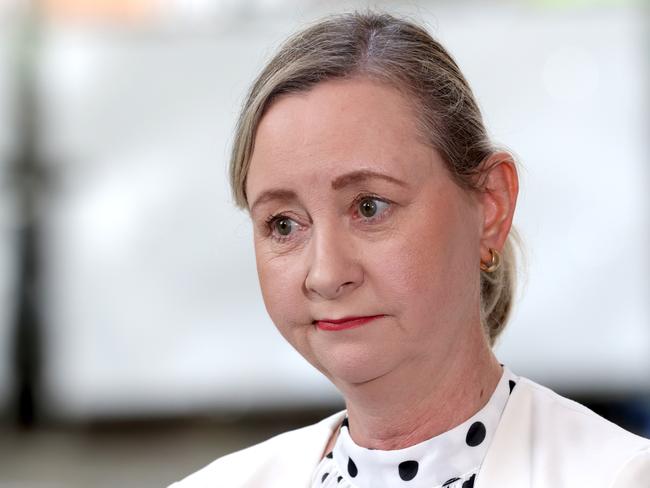Des Houghton: State gov’s radio silence on Qld’s $25bn money laundering explosion
The Crime and Corruption Commission has warned of an explosion in Queensland’s criminal economy with the value of money laundered in the state last year possibly as high as $25 billion.
Des Houghton
Don't miss out on the headlines from Des Houghton. Followed categories will be added to My News.
The Crime and Corruption Commission has warned of an explosion in the criminal economy with the value of money laundered in Queensland in 2023 at least $10 billion, and perhaps as high as $25 billion.
A scathing report by the corruption watchdog says laws to seize criminal assets are still “not fit for purpose” despite expert advice to fix them stretching back to 2013.
Frankly, it defies reason that a succession of attorney-generals have failed to implement the recommendations from experts including a former High Court judge.
The new CCC report says Queensland law does “not represent the modern reality of money laundering” and “significant action is needed by the Queensland Government to ensure that the Act can have the disruptive impact on serious and organised crime”.
It adds: “Queensland risks becoming a money-laundering haven because its money-laundering offence has not kept up with the modernisation efforts made in other Australian jurisdictions.
“Queensland’s money laundering offence is confusing and, in a legal sense, not functional. It substantially relies upon the definition of ‘tainted property’ in the Criminal Proceeds Confiscation Act which, unhelpfully, is defined to include ‘tainted property’.
“The offence is also based on a concept of ‘self-launderers’ – that is, the offence assumes that someone who is engaging in serious criminal activity is also personally attending to any money laundering required to conceal the criminal activity.
“This does not represent the modern reality of money laundering for serious crimes, where there is separation between the criminal offender (or offending) and the money laundering activities, and where the latter is increasingly undertaken by professional facilitators as a service, often using global networks.’’
Federal law enforcement agencies agree profits from multibillion-dollar drug trafficking, international fraud and tax evasion fuels money laundering. It is a mystery to me why Queensland appears to have run dead on these vital reforms. By failing to do so the state is giving the impression that it is soft on organised crime.
In other states asset confiscation regimes have evolved in recent years in response to changes in the criminal environment and the proliferation of digital currencies.
Why does Queensland lag behind?

Is it incompetence or is there a good reason that we are not being told? If our laws are “not fit for purpose” neither are Premier Steven Miles and his bungling Attorney-General Yvette D’Ath. They have some explaining to do.
The CCC report is a substantial one that says our asset confiscation regime “has significant gaps that undermine efforts to seize control and handle digital assets”. Curiously it does not identify its author.
The report makes several recommendations, some of which have been made before.
“Contemporary serious and organised crime is complex, highly adaptive, and can be extremely lucrative,” the CCC warns.
“It frequently involves digital assets (including cryptocurrency), offshore links or elements, and decentralised financial transactions that are difficult for law enforcement to trace.
“Billions of dollars in criminal funds are estimated to flow through Queensland’s criminal economy each year – in 2022–23 the value of money laundered in Queensland was estimated at between $10 and $25 billion.
“Meeting the challenge of serious and organised crime requires innovation, cross-agency collaboration, and significant investment. It also requires legislation that is fit-for-purpose and flexible enough to respond to the changing nature of the crimes it deals with. Queensland’s Criminal Proceeds Confiscation Act 2002 (CPCA) is the State’s key statute that is currently used to attack the profitability of serious and organised crime by enabling asset confiscation. The CPCA’s aim is to remove financial gain, increase financial loss and heighten the risks associated with such crimes.
“In 2023 the Crime and Corruption Commission (CCC) commenced a review of the CPCA to examine whether Queensland’s asset confiscation regime was still effective in the face of a contemporary organised crime environment.
“It looked at the schemes available under the asset confiscation regime pertaining to countering the problem of crime-derived and used assets and money laundering and preventing individuals from accumulating criminal wealth.’’

The CCC has since 2003 gained a lot of experience in investigating proceeds of crime and should not be made to work with one hand tied behind its back.
Mysteries remain. Former High Court judge Ian Callinan and law professor Nicholas Aroney made recommendations about tracking unexplained wealth in their 2013 review of the CCC.
And they proposed a one-stop-shop where the CCC and the Director of Public Prosecutions, who share responsibility for the confiscation scheme, could work together. Everyone thought it was a good idea, but nothing happened. The CCC and the DPP still work at arm’s length with some suggestions of friction and perhaps a power struggle.
In 2015 an organised crime inquiry by Michael Byrne QC recommended victims be compensated from a fund enriched by the sale of seized criminal assets. Nothing happened.
Two years later the CCC wrote to Attorney-General D’Ath asking about the fund. The CCC said it did not receive a reply.
The Parliamentary Crime and Corruption Committee said in 2020 said the definition of money laundering had to be amended.
The then Attorney-General Shannon Fentiman agreed. Nothing happened.
In 2023 the CCC recommended the laws be upgraded. Nothing happened.



